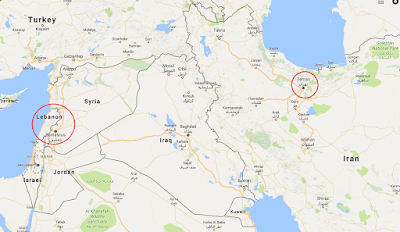...
The broadly multi-faction 'civil war' in Syria is moving into a new state. Probably not an end-state, but something more clearly defined, and certainly more dangerous for the rest of the region. The opportunity for things to go sideways in unexpected ways is much greater now than it has been before, with more of the factions fielding well-equipped, militarily capable armies. Russia, Turkey, Iran Saudi Arabia, America, NATO and Israel are just SOME of the factions involved in the existential struggle of the Alawite Ba'ath regime against a wide variety of insurgents and trans-national Islamic rebel militias, all playing out as the huge 'Caliphate' of ISIS is slowly ground into dust by the US/Kurdish coalition. Almost any day offers the chance of a miscalculation that will lead to a major regional conflict involving multiple nuclear powers.
But today I really just want to highlight one particular upcoming problem. It's not something that's getting a lot of discussion, but because of some of the international relationships among the various combatants, it could be the most critical and dangerous problem in the war. Let me show you a map:
In the east you have Iran. In the west, on the Mediterranean, you have Lebanon, and critically, Israel. In between you have Iraq and Syria. Lebanon is dominated by a Shi'ite Islamic political organization called Hezbollah, which is a wholly owned subsidiary of Iran, Inc. And, it should be noted, is deeply hated and feared by Israel as the only military force in the region that can fight the IDF straight up and win. Iraq is, if not a wholly owned subsidiary of Iran, Inc. at least a junior partner. The Persian Shi'ites sheltered and protected the Iraqi Arab Shi'ites who were grossly persecuted by the Saddam Hussein regime, and then when the US helpfully toppled Saddam, they moved back to Iraq and took control of the government, while returning the favor and persecuting the Iraqi Sunnis. Now, as the Syrian army (SAA) is weakened and exhausted by years of bloody war, the Iranian militias under Russian air support are the primary forces available to Assad to hold on to power. The Israelis haven't done anything massive yet because it's been very difficult for Iran to move heavy weapons into Lebanon for Hezbollah to use, but that situation is about to change.
The only thing standing between an easy 1200km road route from Tehran to Beirut is an outpost of American backed rebels and some US 'advisers' in southeast Syria on the Iraq border. That's where all the action was last month, where an American F-16 shot down a Syrian bomber and a couple of drones. Ground Zero is a village called al Tanf. Bear in mind that these are rebel fighters - at war with the Syrian government - and their US benefactors are in Syria illegally, as the Syrian government does not want them there and has not given them permission to enter the country. This makes the whole exercise fraught. Just how hard will the US fight to keep that road route closed?
And if Israel believes that Iran could begin to ship endless truckloads of rockets, missiles, artillery, drones, armored vehicles and other military hardware to Lebanon, what might they do? One suspects the US will be willing to commit major forces and risk major regional conflict to keep Israel from doing something massive that changes the status of the region.
Much of the problem is predicated on the political narrative the west has built around Iran. Israel had to designate a new boogeyman when the Palestinian threat was crushed, and they chose Iran. The US has had an institutional hatred for Iran since the embassy takeover in 1979. This has resulted in the very odd condition of the US officially describing Iran as an authoritarian theocracy, a brutal dictatorship and a global sponsor of terrorism, but not using any of those terms to describe Sunni Wahabbist Saudi Arabia, which arguable fits the description much better.
If the Iranian militias and the Syrian Army want to push the rebels out of southeastern Syria and open up the road route, the Russians will have to decide whether to provide the air support that will bring them into direct conflict with the Americans. And later, if that overland direct route is opened, the Israelis might consider bombing the trucks, which will bring THEM into the range of Russian/Syrian advanced SAMs and once blood is spilled, the outcome is anybody's guess.
...
Musical Study Aids
4 hours ago
